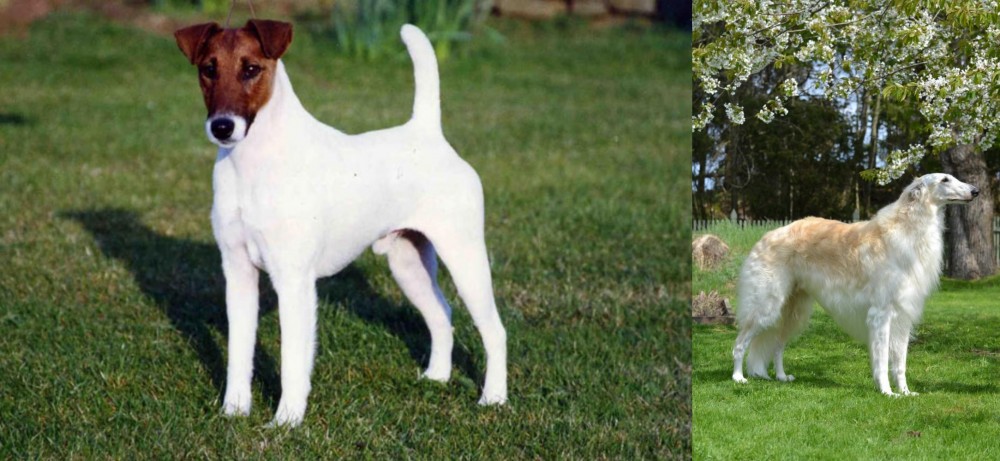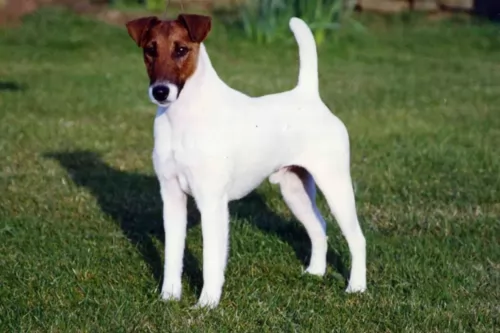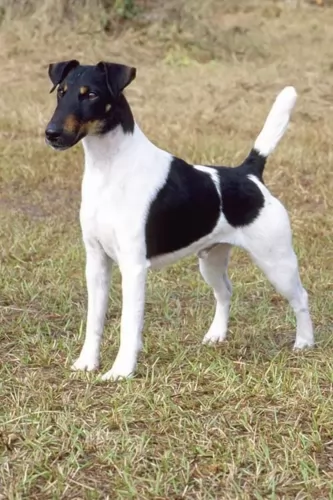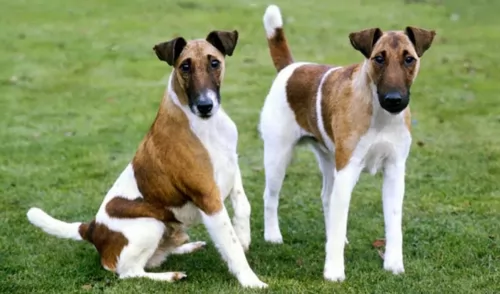 Petzlover
Petzlover Fox Terrier (Smooth) is originated from United Kingdom but Russian Hound is originated from Russia. Fox Terrier (Smooth) may grow 26 cm / 10 inches shorter than Russian Hound. Fox Terrier (Smooth) may weigh 36 kg / 79 pounds lesser than Russian Hound. Both Fox Terrier (Smooth) and Russian Hound has almost same life span. Both Fox Terrier (Smooth) and Russian Hound has same litter size. Fox Terrier (Smooth) requires Moderate Maintenance. But Russian Hound requires Low Maintenance
Fox Terrier (Smooth) is originated from United Kingdom but Russian Hound is originated from Russia. Fox Terrier (Smooth) may grow 26 cm / 10 inches shorter than Russian Hound. Fox Terrier (Smooth) may weigh 36 kg / 79 pounds lesser than Russian Hound. Both Fox Terrier (Smooth) and Russian Hound has almost same life span. Both Fox Terrier (Smooth) and Russian Hound has same litter size. Fox Terrier (Smooth) requires Moderate Maintenance. But Russian Hound requires Low Maintenance
 The Smooth Fox Terrier is one of two Fox Terrier breeds, the other being the Wirehaired Fox Terrier. Fox Terriers are believed to be one of the oldest terrier breeds and the ancestor of many terriers who came after. The Fox Terrier was recognized by the American Kennel Club in 1885 and the smooth Fox Terrier as a separate breed 100 years later in 1985. Some clubs still consider the two types of Fox Terriers as the same breed. The standard for smooth Fox Terrier was written in 1876 but not accepted until 1985.
The Smooth Fox Terrier is one of two Fox Terrier breeds, the other being the Wirehaired Fox Terrier. Fox Terriers are believed to be one of the oldest terrier breeds and the ancestor of many terriers who came after. The Fox Terrier was recognized by the American Kennel Club in 1885 and the smooth Fox Terrier as a separate breed 100 years later in 1985. Some clubs still consider the two types of Fox Terriers as the same breed. The standard for smooth Fox Terrier was written in 1876 but not accepted until 1985.
Both breeds of Fox Terriers are thought to originate in the late 1800’s descended from various British Terriers, the beagle, the dachshund and the Fox Hound. The Smooth Fox Terrier has a base coat that is white. The hunters bred them this way, so they would not mistake them for the fox during the hunt. They have also been very successful in prestigious dog shows including Crufts in England and New York Westminster in the United States.
They are not that popular today unless you are hunting and showing them in Confirmation Competitions. However, the Smooth Fox Terrier is significant because of all the terriers that consider it their direct ancestor. This would include the Jack Russel, the Rat Terrier and the Miniature Fox Terrier.
 There are sportsmen and hunters who appreciate the versatile Russian Hound. The Russian Hound has been a popular working breed in its homeland for a long time as it is an ancient dog breed.
There are sportsmen and hunters who appreciate the versatile Russian Hound. The Russian Hound has been a popular working breed in its homeland for a long time as it is an ancient dog breed.
This is an ancient dog breed, being developed by crossing common hunting dogs with indigenous ovcharkas and Laikas. Later European hunting dogs were also introduced into the mix.
The dogs numbers have declined but were later revived in the late 1800s. The first breed standard for the Russian Hound was created in 1896. Known as the Russkaya Gontchaya, this tough dog is still popular in all parts of Russia.
 The Smooth Fox Terrier is distinguished from the Wirehaired and other terriers by his V-shaped head and white based coat. The coat can have tan, black and black and tan marks on the white coat. The Smooth Fox Terrier is sturdy, strong, sleek and symmetrical. The breed has a short back, and proportioned legs. The Smooth Fox Terrier has a flat skull and tapered muzzle. The nose is black, and the eyes are dark. He has v-shaped ears and a docked tail. Docking is no longer legal throughout the United Kingdom.
The Smooth Fox Terrier is distinguished from the Wirehaired and other terriers by his V-shaped head and white based coat. The coat can have tan, black and black and tan marks on the white coat. The Smooth Fox Terrier is sturdy, strong, sleek and symmetrical. The breed has a short back, and proportioned legs. The Smooth Fox Terrier has a flat skull and tapered muzzle. The nose is black, and the eyes are dark. He has v-shaped ears and a docked tail. Docking is no longer legal throughout the United Kingdom.
 The Russian Hound is a medium to large sized dog. He stands at roughly 62 – 67cm in height and weighs roughly 36 to 45kg. The dog however is available in a number of different sizes.
The Russian Hound is a medium to large sized dog. He stands at roughly 62 – 67cm in height and weighs roughly 36 to 45kg. The dog however is available in a number of different sizes.
The coat is fairly short and dense, becoming fuller in Winter. The coat color is fawnish with a darker brown, blackish saddle on the back. The paws have some white markings. The eyes are medium length and the tail is long and held down.
The Russian Hound is a peaceful, calm dog, not making a fuss around strangers, but accepting them well. He may be calm, but he is independent and strong willed.
Training and socialization will be good for him, making him obedient and well mannered.
 Children friendliness They shouldn’t be trusted with young children but if raised with older children ok
Children friendliness They shouldn’t be trusted with young children but if raised with older children ok
They are good at performing tricks, Search and rescue, narcotics detection, tracking, and disability assistance.
Fox Terrier is adaptable and can live anywhere. He is not a big dog but remember he is very high energy.
They have very good learning ability and are very intelligent but can be stubborn
 Everybody wants a peaceful, loving dog that can be a good pet and companion without causing a lot of trouble. The Russian hound is a peaceful, loving, loyal dog who is going to make any family a wonderful 4-legged fried.
Everybody wants a peaceful, loving dog that can be a good pet and companion without causing a lot of trouble. The Russian hound is a peaceful, loving, loyal dog who is going to make any family a wonderful 4-legged fried.
He can adapt to life in the city or the countryside so long as he is given a good loving home and plenty of exercise.
 One of the major problems for the Smooth Fox Terrier that the Wirehaired does not face is the potential for deafness. This is an issue in dogs that are mostly white in color. Other concerns that he does share with the Wirehaired Terrier are:
One of the major problems for the Smooth Fox Terrier that the Wirehaired does not face is the potential for deafness. This is an issue in dogs that are mostly white in color. Other concerns that he does share with the Wirehaired Terrier are:
Causes muscle weakness and problems swallowing.
 The Russian Hound is a healthy breed. Nonetheless even the healthiest dog breeds can become ill.
The Russian Hound is a healthy breed. Nonetheless even the healthiest dog breeds can become ill.
Good food, exercise and lots of love and attention can ensure a long life for him.
However every dog can have one of the many common dog illnesses there are. Toothache can be a serious problem for your pet because if you don’t look in his mouth you won’t be able to tell if he has a bad, painful tooth.
Dogs can also break their teeth, causing sharp, jutting pieces which cut the gums. They can also get gum disease. Plaque can cause a whole lot of bacteria in your pets mouth. With the increase in bacteria, your dog’s health problems increase too. It is imperative to look in your pets mouth and speak to your vet about canine dental maintenance.
Eye infection are a common problem with dogs, and an eye infection can be from allergies. Yellow pus can indicate an infection. It is best to speak to your vet because some eye infections can lead to blindness if left untreated.
 Feed 2-3 meals per day and divide 1/8-1/4 cup
Feed 2-3 meals per day and divide 1/8-1/4 cup
Feed two meals per day and divide ½ cup
hearing and vision
The Smooth Fox Terrier is an athlete requiring a lot of exercise. Take him on long walks and play with him in a large fenced yard. Don’t coup him up in the house. Be careful not to exercise him off leash as he will chase anything that moves and will not come when called. They need mental stimulation as well as physical. They are good at hunting, agility, tracking, performing tricks and being a watchdog.
 As a hunting dog, you will need to ensure your Russian Hound gets enough exercise. He will love his walks with you but will want to be let off his leash when in the park. He loves the opportunity to run free. Games at home in the garden will also be good for this large dog.
As a hunting dog, you will need to ensure your Russian Hound gets enough exercise. He will love his walks with you but will want to be let off his leash when in the park. He loves the opportunity to run free. Games at home in the garden will also be good for this large dog.
Provide your pet with a nice, warm, dry sleeping area.
Make sure your pet’s vaccines are up to date.
Have your dog neutered or spayed to prevent unplanned puppies.
Groom your Russian Hound by brushing him twice a week.
Check him over for lumps while brushing him.
Check inside his ears for signs of redness.
Trim his nails.
Look at his eyes and make sure they are clear with no signs of discharge.
Check inside the mouth for rotten or bad teeth as this can cause tremendous pain and also cause toxins to get into the bloodstream.
The Russian Hound relies on vitamin and mineral enriched food. The best commercially manufactured dog foods can provide this. These foods are wonderfully convenient. Try not to give your dog dry kibble day after day, but vary it twice a week with some home-made food.
Simply add into one big pot chicken, brown rice or pasta and spinach, sweet potatoes and carrots. This food can all be chopped up and added in to the dry kibble twice a week. It is wonderfully tasty for your your canine friend. Dogs thrive on simple, consistent meals. Ty and add some raw meat to his food occasionally.
Ensure there is always a bowl of fresh, cool water within his reach.